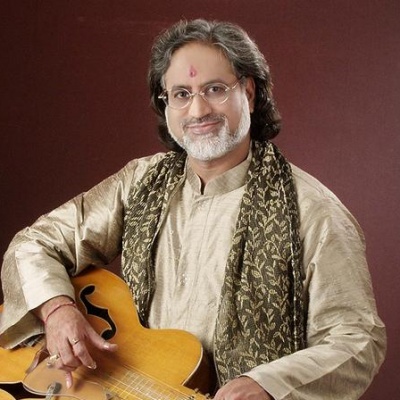
Vishwa Mohan Bhatt
维沙瓦·莫罕·布哈特(也译为毗湿瓦·莫汉·巴特,Pandit Vishwa Mohan Bhatt)是杰出的印度音乐家,西塔琴演奏家拉威·香卡最成功的弟子。 早在1970年 Vishwa Mohan Bhatt 就已经成为印度著名的艺术家,并跟随他的老师一起到国外巡回演出,灌制唱片(包括参与拉威·香卡1980年起的克里姆林宫演出),但是真正为他带来国际影响力的是和美国滑音吉他手 Ry Cooder 共同录制的专辑《A Meeting By The River》,该专辑获得了1994年葛莱美奖最佳世界音乐专辑奖项。 by Craig Harris Vishwa Mohan V.M. Bhatt is one of Indias most innovative musicians. The inventor of the Mohan Veena, a nineteen string modified archtop guitar with three melody strings, four drone strings and twelve sympathetic strings, Bhatt has created a sound that blends the western Hawaiian guitar with sitar, sarod and veena techniques. The first Indian musician to be awarded the Musical Scientist award in Banglore, India, Bhatt was praised by Acoustic Guitar magazine as one of the greatest and mosty expressive slide players in the world. The Edmonton Journal referred to Bhatt as an inspiration even to Western guitarists. A long time student of Ravi Shankar, Bhatt belongs to an elite group of musicians whose imeage traces back to Mughal emperor Akbars court musician Tansen and his Hindu guru, Swarmi Haridas. In addition to six solo albums, Bhatt has recorded with Ry Cooder, Bela Fleck, Jerry Douglas, Taj Mahal and Arabian oudh player Simon Shaheen. Bhatt became the first Indian to collaborate with a Chinese musician when he toured with Erhu player Jei Bing Chen. Bhatts collaboration with Ry Cooder, A Meeting By The River received a Grammy award in 1994. His collaboration with Bela Fleck and Jei Bing Chen, Tabula Rosa, recorded in a Santa Barbara, California church in October 1994, was nominated for a Grammy. Tunes from A Meeting By The River and Mumtaz Mahal, recorded with Taj Mahal, were featured on the soundtracks of films, Two Days In The Valley and the Oscar award-winning, Dead Man Walking. Bhatt is a skilled composer. His composition, Raga Ganga, was performed during celebration of Indias fiftieth year of independance.
